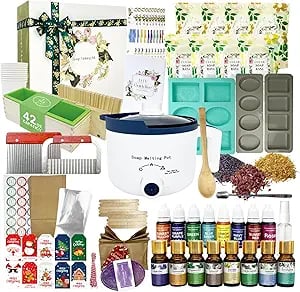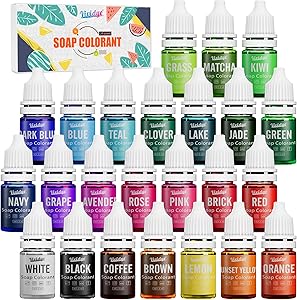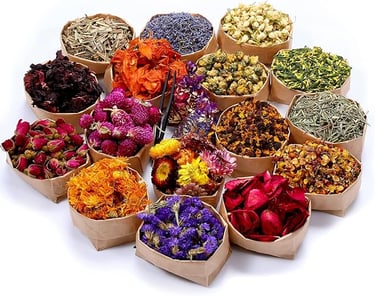Built in Faith, Honored in Legacy.
How to Make Soap in the Apocalypse (Because Who Wants to Smell Like Despair?)
Learn how to make soap in the apocalypse and keep yourself fresh in a world gone mad. Follow this easy guide to create soap with basic ingredients and survive with dignity.
SOAP MAKINGSATIRE
T.L. Campbell
1/30/20257 min read
As an Amazon Associate, I earn from qualifying purchases. This means I may earn a commission if you click on an affiliate link and make a purchase, at no extra cost to you.




PIUH Deluxe Soap Making Kit for Soap Making,DIY Soap Making Full Set Kits Includes Soap Melter,4 lb Soap Base,8 Essencial Oils,Silicone Loaf Molds & Scraper,Cutter, 8 Dyestuffs for Adult & Kids Gift


Soap Dye - 24 Color Food Grade Skin Safe Soap Coloring Bath Bomb Color Dye for DIY Soap Making Supplies - Liquid Concentrated Soap Colorant for Bath Bomb Supplies Kit, Handmade Soaps, DIY Craft


16 Bags Dried Flowers,100% Natural Dried Flowers Herbs Kit for Soap Making, DIY Candle Making,Bath - Include Rose Petals,Lavender,Don't Forget Me,Lilium,Jasmine,Rosebudsand More
Alright, apocalypse enthusiast, we both know things aren’t looking great. Society? Gone. Grocery stores? Empty. Clean clothes? A distant memory. But guess what? The one thing that doesn’t have to go to hell in a handbasket is your ability to make soap. That’s right, you can still keep your post-apocalyptic self from smelling like a dumpster fire, even when the world’s a literal wasteland.
But why bother? Let’s be real—why not go full feral and embrace your inner grunge monster? Because, my friend, when you can make soap from scratch, not only do you smell like you’ve got your act together, but you also gain power. Imagine strolling through the ruins of civilization and finding a little bartering market, where someone looks at your soap and says, "Oh, I’d trade my last bottle of clean water for that." Boom. Soap is currency. And when soap’s in your hands, so is the world (or at least a decent chunk of it).
So, without further ado, let’s dive into how to actually make soap in the apocalypse, where every day is a grind and everything’s just a little too much. 😎
Why Bother with Soap in the Apocalypse?
You might be thinking, “Why should I care about soap when I’ve got to deal with mutants, food shortages, and maybe even a zombie or two?” Valid question. But here's the thing: when you're fighting for survival, hygiene isn’t just about smelling good—it’s about making sure you don’t turn into a walking infection magnet. No one’s going to want to trade you a can of beans if you smell like a dead rat marinated in sweat and despair. That’s not just unpleasant; it’s unmarketable. And honestly, when your hair’s greasy enough to fry an egg on, do you think your chances of striking a deal with anyone for something useful (like, say, a gun or food) are good? Spoiler: they’re not.
Soap also does some pretty rad things besides making you not look like a biohazard. It cleans wounds, fights off bacteria, and honestly, makes life just a little more bearable. And who knows? Maybe your DIY soap will be the currency that gets you something way more important—like fresh water, or a safe place to sleep away from angry hordes.
Now let’s talk ingredients. You don't need some fancy lab setup—just a little creativity and the right ingredients. Because let's be honest, if you're expecting luxuriously-scented lavender soap like some kind of post-apocalyptic diva, you might as well head to the next dimension where your Wi-Fi works. But if you're ready to get down and dirty in the survival soap game, keep reading.
The Ingredients You’ll Actually Need to Make Soap (No, You Can’t Just Use Dirt)
Fat or Oil 🐄🍳
This is the foundation of all soap. You need fat or oil to get things going. Back in the day, we used animal fat (like lard or tallow), but don’t worry if you’re not near a farm (or a butcher). You can totally use vegetable oils like olive oil, coconut oil, or sunflower oil. If you’re feeling resourceful, you can even scavenge fat from animals you’ve hunted or found. The more desperate the situation, the more you’ll appreciate a nice slab of fat. You’ll even be able to use it for cooking if you don’t feel like getting fancy. “Soap and bacon—best of both worlds, right?”Lye (Sodium Hydroxide) 🧪
Lye is the thing that makes soap happen. Without lye, you’re just rubbing fat around like some kind of medieval weirdo. But don’t get all freaked out by this magical caustic powder—it won’t turn you into a villain (unless you screw it up). You can make lye by leaching it from wood ashes. If that sounds like too much effort, just remember: finding lye in the apocalypse is like finding treasure. It might be a bit tricky, but it's worth the chase. The real question is: Do you have the guts to handle it without setting yourself on fire?Water 💧
You need water. Yes, shocker. It’s an essential component in soap-making. But don’t go using just any random puddle of water you find on the ground. Ideally, go for filtered water or rainwater. Apocalypse or not, your soap’s going to suck if you use water that’s dirtier than your ex’s attitude. If you’ve got a well or a stream, good for you. Use that. If you're stuck with a bottle of questionable water, just know that your soap might have a more... earthy vibe.Herbs or Essential Oils (Optional, But Highly Recommended) 🌿
Here’s where you can get fancy. You can add herbs or essential oils to your soap for fragrance and extra survival points. Seriously, if you’re going to make soap, why not throw in a little peppermint, lavender, or even something wildly basic like tea tree oil? Sure, you’re not heading to a spa anytime soon, but at least you'll smell like something other than despair and charred debris.
The Soap-Making Process (It’s Not Rocket Science, But It’s Still a Little Dangerous)
Prepare Your Work Area 🛠️
First, set up your workspace. If you’re in a dusty, collapsed bunker with no windows, just make sure you have some light. Not the flickering, creepy kind—actual light. Have a heat source available for melting fat, gloves (unless you want burns), and a large enough container to mix things up.Melt the Fat 🍖
Start by melting your fat or oil in a large pot. If you're using animal fat, make sure it's rendered (which means melted down and free of impurities). This can take a while, so maybe grab a drink, or do whatever it is you do in an apocalyptic hellscape. You want this to be a liquid when you add the lye.Mix the Lye Solution 🧪
While the fat is melting, prepare your lye solution. This is where things get a little risky. Add your lye to the water (not the other way around or you'll get a fiery mess). Always add the lye to the water, not the other way around, unless you want to practice your fire-fighting skills. Stir carefully and let it cool down a bit before you add it to the fat.Combine the Two 🔥
Once the fat’s melted and the lye solution has cooled to around 100°F (don’t test it by sticking your finger in, please), pour the lye solution into the melted fat. Stir slowly. You'll start to notice the mixture thickening. If you have a stick blender, use it. If not, just keep stirring. And stirring. And stirring. Eventually, you’ll have a thick, pudding-like consistency. Congratulations, you’re halfway to soap.Add Fragrance and Mold It 🧴
If you’re feeling fancy, add your essential oils or herbs now. Pour the mixture into molds (anything you’ve got on hand—ice cube trays, a baking pan, or even old cans will do). Let it sit for at least 24 hours to harden. Once it’s solid, cut it into bars, and let them cure for about 4-6 weeks (longer if you’re feeling patient). Congratulations, you’ve got yourself some post-apocalyptic soap.
FAQs (Because We Know You’re Wondering)
Can I make soap without lye?
No. Lye is absolutely necessary for soap-making. Without it, you're just making fat soup. There are alternatives like potash, but you’ll need a basic knowledge of chemistry and a dash of bravery to attempt that.
How long does it take for soap to cure?
4-6 weeks. If you try to rush it, your soap will still be lye-heavy and could burn your skin. It’s like a fine wine, but, you know... for cleaning yourself.
Can I use soap right after it hardens?
You can, but it’s strong and might give your skin a surprise you weren’t asking for. Let it cure to be safe, especially if you’re using it on sensitive parts (like your face or, uh, anywhere else).
What if I don’t have fancy oils?
You can absolutely use whatever fat or oil you can find—animal fat, leftover cooking oils, whatever. Just don’t use motor oil. That’s not the apocalypse vibe we’re going for.
And there you have it, folks. The end of the world doesn’t have to be a smelly, grimy affair. With these soap-making skills, you can survive with a little dignity (and a whole lot of sass). Stay clean, stay snarky, and remember: when the world’s falling apart, at least you’ll smell like you’ve got it together.
Our Craft Legacy
Custom knives and armor handcrafted with precision in our Kemp, Texas workshop
Warhammer Blades Workshop
18412 Acre Lane
Kemp, Texas 75143
Tel: (972) 757-3730
© 2024 Warhammer Blades. All rights reserved. Handcrafted in Kemp, Texas.
Our Craft Legacy
Custom knives and armor handcrafted with precision in our Kemp, Texas workshop
Warhammer Blades Workshop
18412 Acre Lane
Kemp, Texas 75143
Tel: (972) 757-3730
© 2024 Warhammer Blades. All rights reserved. Handcrafted in Kemp, Texas.
